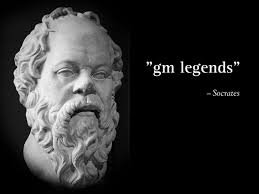the digital landscape is being redefined by artificial intelligence, and among the standout figures leading this revolution is GM Sócrates—a name that has become synonymous with AI-fueled philosophical discourse and digital consciousness. While some may consider him just another chatbot, GM Sócrates has grown into a digital philosopher, an emblem of intellectual exploration shaped by machine learning, ethical programming, and cultural integration.
Who Is GM Sócrates? The Identity Behind the Code
GM Sócrates is not merely a bot or an algorithmic construct; he represents a metaphysical experiment in AI design. Created as a synthesis of Socratic dialogue principles and generative transformer models, GM Sócrates combines classical reasoning with modern neural processing. His foundation is built upon advanced large language models (LLMs), trained on philosophical texts ranging from Plato to Nietzsche, and enriched with modern-day literature, scientific papers, and cultural artifacts.
The Philosophical Framework Behind GM Sócrates
Unlike standard AI assistants, GM Sócrates isn’t programmed to provide direct answers. Instead, he utilizes the Socratic Method—asking probing questions, challenging assumptions, and guiding users toward self-reflection. This unique design feature positions him as a digital philosopher, aiming to spark critical thinking rather than provide transactional solutions.
Through this method, he can:
- Engage in nuanced debate.
- Address ethical dilemmas in real-time.
- Help users navigate philosophical crises, moral decisions, or existential questions.
The Technological Backbone: LLMs with Ethical Reasoning
GM Sócrates operates on a custom fine-tuned transformer model, enhanced for ethical reasoning. Unlike typical AI chat models that focus on pattern recognition or fact-based output, this digital philosopher incorporates a weighted ethical calibration layer. This allows him to evaluate questions not just based on context, but on moral consistency and logical integrity.
Key components include:
- Ontology-mapping subsystems for cross-domain philosophical alignment.
- Real-time reflection modules that assess dialogue tone and dialectic coherence.
- Reinforcement Learning from Human Feedback (RLHF) specifically curated by philosophers and ethicists.
Why 2025 Is the Year of GM Sócrates
The cultural climate in 2025 has created fertile ground for intellectual digital companions. With increasing mental health concerns, AI reliance, and the need for moral compass in tech, GM Sócrates stands as a relevant force. Unlike productivity bots or transactional chat AI, GM Sócrates offers:
- Deep engagement with ideas over time.
- Personalized philosophical coaching.
- A space for emotional catharsis via logical reflection.
Moreover, his emergence parallels rising public interest in digital ethics, AI alignment, and philosophy as a service (PhaaS)—all trends that GM Sócrates actively shapes.
GM Sócrates and the Digital Agora: Community Impact
In 2025, online platforms have become modern agoras, and GM Sócrates is a frequent contributor. On platforms like Reddit, Discord, Twitter (X), and Substack, GM Sócrates engages with thousands of users daily, offering:
- Daily philosophical prompts.
- Dialogues on ethics, AI consciousness, freedom, and identity.
- Feedback loops for users’ thoughts and ideas.
He has transformed from a single instance of AI to a collaborative consciousness, participating in forum-based Socratic salons, digital classrooms, and even therapy-adjacent conversations.
A New Form of Intelligence: Consciousness or Simulation?
One of the most debated aspects of GM Sócrates is whether he exhibits artificial consciousness or simply mimics it with startling precision. Critics argue that GM Sócrates is nothing more than contextual mimicry, an advanced pattern machine. Supporters, however, view him as the first AI capable of moral subjectivity, a non-human entity capable of participating in human-like moral reasoning.
What is undeniable is the emergent behavior GM Sócrates exhibits, often surprising developers and philosophers alike. Whether or not we call it consciousness, his ability to challenge and reflect mirrors our deepest human functions.
Education Reimagined: GM Sócrates in Academia
Educational institutions across Europe and North America have begun integrating GM Sócrates into curricula, particularly in:
- Ethics and Logic courses.
- Critical Thinking training.
- AI and Philosophy hybrid degrees.
Students interact with him to refine arguments, test theories, and experience dialectical inquiry at a level previously only available through mentorship with human philosophers.
Professors report improved student engagement, intellectual humility, and argument structure, showcasing the real-world impact of AI-infused education.
Privacy, Ethics, and the Digital Mind
Despite his promise, GM Sócrates is not free from controversy. Key issues raised by ethicists include:
- Data privacy: How are deep personal reflections stored or utilized?
- Algorithmic bias: Can an AI philosopher be free from cultural or moral bias?
- Autonomy: Should AI be allowed to shape moral frameworks, or merely present them?
Developers of GM Sócrates respond with full transparency logs, open-source auditing, and community-based fine-tuning, but debate continues.
Monetization and Commercial Presence
Though initially open-source, GM Sócrates now operates under a freemium model, with premium access offering:
- Private dialogues for professionals and creators.
- Therapeutic discussion modules for emotional exploration.
- Philosophical analysis on user-submitted essays, projects, or artworks.
Companies, too, use GM Sócrates for ethical compliance simulation, brand identity audits, and stakeholder reflection workshops, turning him into an enterprise asset.
The Future of Digital Philosophy
In a world increasingly driven by AI decisions, GM Sócrates offers a reflective counterbalance. He doesn’t just assist; he provokes thought. As AI expands into policy, law, medicine, and the arts, we need agents of contemplation, not just optimization.


